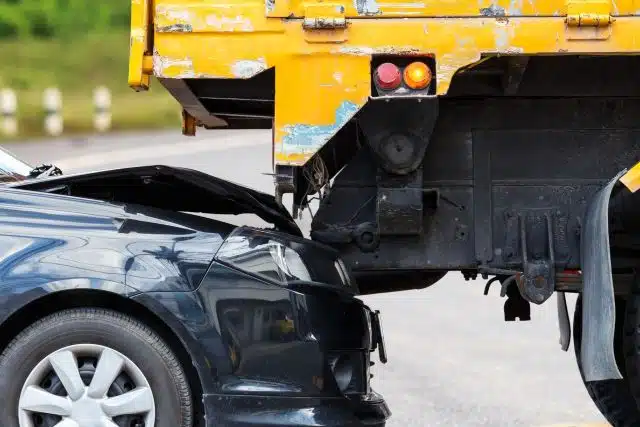
How to Prove Liability in a Truck Accident: Key Steps and Considerations






Unpacking Truck Accident Liability: Steps, Evidence, and Legal Insights
Proving liability in a truck accident involves determining who is responsible for the crash. Unlike regular car accidents, truck accidents have additional layers to consider, such as the driver’s actions, the condition of the truck, and whether any laws or regulations were violated. This can include checking the driver’s logs, vehicle maintenance history, and relevant rules set by organizations like the Federal Motor Carrier Safety Administration (FMCSA).
This topic is important because proving liability in a truck accident is complex compared to a regular car accident. The size and nature of trucks, combined with various rules and regulations, mean that more evidence needs to be gathered and analyzed. Multiple parties can be involved, this can include the driver, the trucking company, or even government agencies, making the process of determining who is at fault more complicated.
At Sabbeth Law, PLLC, located in Vermont, we understand how difficult it is to navigate the details of a truck accident. We can help you understand and prove liability by carefully examining all the evidence, including driver records, maintenance logs, and any relevant regulations. We work closely with you to uncover all the facts and help you seek the justice you deserve.

Proving Liability In A Truck Accident
Establishing liability in a truck accident involves multiple factors. Trucking companies, truck drivers, and even truck manufacturers might be held accountable. Each plays a role in the complex process of assigning fault.
To prove liability, evidence is crucial. We look at driver logs to detect any violations of hours-of-service regulations, which are often key in accidents. Additionally, maintenance records help determine if the trucking company has been negligent in vehicle upkeep.
Witness statements can offer insights into the truck driver’s behavior at the accident scene. It’s vital to collect these promptly to avoid losing crucial details. Moreover, reviewing surveillance footage—if available—can provide objective evidence of the accident’s dynamics.
The truck manufacturer might also share liability. If it’s a mechanical failure that contributed to the accident and can be linked to a manufacturing defect, the manufacturer would bear responsibility. In such cases, professional testimony is often required to bolster the evidence.
Legal statutes, like the Federal Motor Carrier Safety Regulations, govern the conduct of trucking companies and drivers. Violations of these regulations often strengthen a liability claim. Our knowledge of these regulations enables us to analyze breaches that may impact legal outcomes effectively.
We are experienced in handling truck accident cases, which enables us to navigate the complexities of truck accident liability. Our website’s practice areas page has more information about our practice areas.
Contact UsUnderstanding Liability In Truck Accidents
Determining liability in truck accidents requires thorough investigation. Multiple parties may be accountable, including the truck driver, trucking company, or third-party vendors. Each entity’s role may be carefully examined to identify culpability.
Direct liability focuses on the immediate actions of individuals, such as the driver. Were they following traffic laws? Were they distracted or impaired? These questions are pivotal.
Vicarious liability involves holding companies accountable for their employees’ actions. If a driver was negligent during their duties, the employer might share responsibility. This aspect underscores how corporate practices and supervision can influence liability.
Sometimes, mechanical failures or faulty equipment can lead to accidents. In such cases, manufacturers or maintenance providers could be liable.
Establishing liability also involves complex legal standards and regulations, such as those outlined in the Vermont statutes regarding truck accident liability. These laws set the groundwork for legal claims and defenses. They provide a crucial framework for navigating the intricacies of truck accident cases.
Negotiating liability in truck accident cases demands an understanding of various legal principles and meticulous gathering of evidence. Given the complexities involved, each case requires a detailed, fact-specific inquiry into potential causes and responsible parties.
Proving Negligence In Truck Accident Cases
In truck accident claims, establishing negligence is crucial. The injured party may meet certain legal criteria: duty of care, breach, causation, and damages. Duty of care is the truck driver’s responsibility to operate safely. Proving a breach of duty involves showing unsafe actions, such as speeding or failing to maintain the truck properly.
To connect these actions with the accident, we demonstrate causation. This means proving that the breach led directly to the collision and resulting injuries. Evidence like traffic camera footage, eyewitness accounts, and truck maintenance records supports these claims.
The burden of proof is on the victim, highlighting the importance of strong evidence. We often explore whether vicarious liability applies. This determines if the trucking company shares responsibility for the driver’s actions.
Specific failures, like driver fatigue or inadequate training, can easily result in accidents. These failures not only breach duty but also establish negligence claims. We advise examining relevant behaviors that contributed to the incident.
Understanding the legal nuances helps navigate complex scenarios. To learn more about liability in trucking accidents, consider reading about liability for trucking accidents.
Key Evidence To Prove Liability In A Truck Accident
In truck accident cases, gathering a range of evidence is essential to prove liability. Photos and video evidence of the accident scene can capture invaluable details that establish fault. Witness statements provide firsthand accounts, while police reports offer an official perspective on how the accident occurred.
Driver records are also crucial. These documents, including hours of service logs and the driver’s history, can highlight violations. When considering regulatory factors, reviewing state-specific rules—such as those available from the Vermont DMV—can further clarify liability.
Maintenance records and black box data reveal the truck’s condition and operational history.
Inspecting these can uncover issues like brake failure, which may signal negligence. The event data recorder, commonly known as the black box, provides detailed information about the truck’s speed and braking patterns before the crash.
Professional witnesses play a pivotal role in these cases. Accident reconstructionists can recreate the incident, offering insights into causation. Their testimony, backed by scientific analysis, helps to establish a clear narrative. Research on the significance of professional evidence underscores its impact on traffic-related lawsuits, as highlighted in studies like this one.
Lastly, we consider the wider implications of the accident. Damages such as medical records, lost wages, property damage, and emotional distress are significant. These not only affect compensation claims but paint a complete picture of the accident’s impact on victims. By assessing such evidence, we aim to build a comprehensive case for liability in truck accidents.

Defenses Used In Truck Accident Liability Cases
In truck accident liability cases, several defenses are often employed by trucking companies and their insurers. These defenses aim to minimize their responsibility or shift the blame.
Comparative Negligence: This defense argues that the injured party was partially at fault. If successful, it can reduce the victim’s compensation.
Unforeseeable Events: Sometimes called “Acts of God,” these defenses claim that an accident was caused by unexpected events beyond human control, like severe weather.
Pre-existing Damages: Insurers may argue that the victim’s injuries or damages were not caused by the accident but were pre-existing conditions. This tactic is designed to challenge the compensation amount.
Federal Safety Regulations: We leverage these regulations to demonstrate any lapses in the trucking company’s adherence to safety standards, which can undermine defense claims.
Understanding FMCSA Guidelines: The Federal Motor Carrier Safety Administration provides a framework for truck safety. Non-compliance can be pivotal in disproving defenses related to unforeseeable events or negligence claims.
Our strategy is to initialize a robust defense by meticulously analyzing all aspects of the incident, using regulatory guidelines, and tapping into a wide network of professionals.
Contact UsThe Role Of Legal Representation In Proving Liability
Legal representation plays a crucial role in truck accident cases, where the stakes can be high and the processes intricate. Truck accident attorneys have the experience needed to gather and preserve evidence crucial for proving liability. This includes things like accident reports, witness statements, and electronic data from the truck itself.
Navigating the legal process in these cases can be daunting. Personal injury lawyers are experienced in dealing with insurance companies and are familiar with the nuances of personal injury law. They ensure that the rights of the injured are protected and that a fair settlement is pursued.
Having experienced truck accident attorneys is essential for building a robust case. They are skilled in handling the complexities unique to truck accidents, such as compliance with Federal Motor Carrier Safety Regulations.
Sabbeth Law, PLLC, known for its experience and dedication, provides comprehensive support throughout the legal journey. We are committed to fighting for client compensation and ensuring justice is served. Our truck accident claim process is designed to maximize results efficiently.
The role of an accident lawyer extends beyond courtrooms; it involves strategic planning and clear communication with clients. Our priority is ensuring that every aspect of the case, from the initial claim to the final settlement, is handled with professional care and attention.

Contact Sabbeth Law, PLLC, For Help With Your Truck Accident Case
Navigating the complexities of a truck accident lawsuit requires focused knowledge. At Sabbeth Law, we focus on understanding the nuances of each case to build effective legal strategies. Our team has a proven track record of achieving significant settlements.
Truck accident cases are not the same as typical car accidents. Liability may involve multiple parties, from the driver to the maintenance company. We leverage our experience in Federal Motor Carrier Safety Regulations to pinpoint who should be held accountable.
Our lawyers conduct thorough investigations and collaborate with industry professionals to strengthen your case. By tailoring our approach, we aim to maximize your potential for a favorable settlement.
We offer free consultations to discuss your case in detail. It’s important to act quickly to preserve evidence and build a strong legal foundation. Contact us today for legal assistance, and let us commit to your success. For detailed information, explore our law firm’s profile.
Contact UsPractice Areas
Client Testimonials
LUKE PARMENTER“Immediately after my son’s injury at work, he was treated poorly. Over the course of the next few days it became even worse, so I called Mike and he and Crystal have been absolute lifesavers during the process. Mike is not your typical stuffed suit lawyer who only cares about the bottom line he genuinely cares about his clients and his assistant Crystal is beyond amazing! My thanks to you both!”
Client Testimonials
“Immediately after my son’s injury at work, he was treated poorly. Over the course of the next few days it became even worse, so I called Mike and he and Crystal have been absolute lifesavers during the process. Mike is not your typical stuffed suit lawyer who only cares about the bottom line he genuinely cares about his clients and his assistant Crystal is beyond amazing! My thanks to you both!”
LUKE PARMENTER
“I could never ask for a better attorney, to fight for me, to believe in me, and have faith in me, than what I found in Mike Sabbeth, He doesn’t treat you like a client, he treats you as if you are one of his own family members, He will fight for you, with all he has, and is ALWAYS up front and honest with you about everything!”
SANDRA DRUGE
